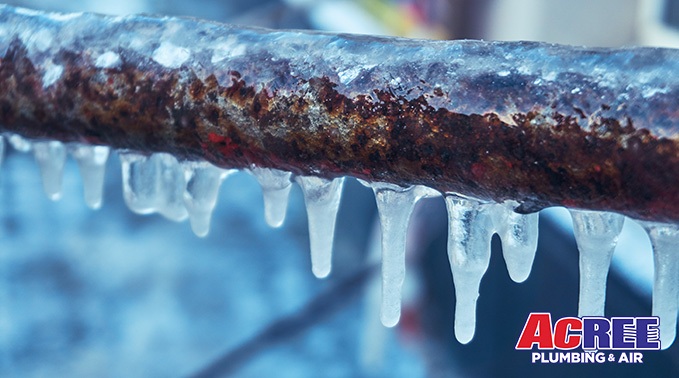
The winter season brings Christmas festivities, cheesy holiday movies and lots of hot chocolate. Unfortunately, it also brings the risk of your pipes freezing and bursting. While the winters are generally mild in Florida, the risk of pipes freezing remains as temperatures can suddenly plummet on certain days. That’s why there is no harm in taking some extra precautions to keep your pipes from freezing in the winter. And to help you out, the pros at Acree have prepared a quick and helpful, guide!
1. If You Leave, Keep the Heat On
If you and your family are planning on leaving your home for a few days, remember to leave your heat on. It might seem wasteful but leaving it on prevents your pipes from freezing over. If your pipes freeze and burst, they can cause extensive water damage to your property. You don’t have to keep the heat as high as you do when you are home but keep it at a temperature higher than 50 degrees. Make sure your home has enough heat to prevent pipes from freezing.
2. Use Pipe Sleeves
One way you can prevent your pipes from freezing over is by insulating them using pipe sleeves. Often, pipes that are in areas such as the attic and basement are prone to freezing and need to be insulated. You can fit these pipes with fiberglass or foam sleeves to prevent freezing which can be relatively cheap. However, if you need to open the walls, ceilings and floors to properly insulate these pipes, it can become expensive and invasive.
3. Keep Cabinet Doors Open
If you notice that temperatures are about to dip, another thing you might want to do is keep your cabinet doors open. Pipes are located in cabinets under kitchen and bathroom sinks and if they burst can cause serious damage. Simply open your cabinet doors so the heat from the rest of your house keeps your pipes warm as well! In addition, it’s a good idea to keep all your interior doors open so heat is consistently circulating around your home.
4. Let Your Faucet Drip
This might sound wasteful, but if you want to prevent high pressure or blockages in your pipes, let your faucet drip for a bit. By opening the faucet attached to the pipe you can release the pressure in the pipe system.
5. Seal Up
If there are any cracks, gaps or holes near pipes in your walls, it’s a good idea to seal them up. Make sure your home is properly insulated and that any caulking is added. In addition, prevent cold outdoor air from coming inside your home by adding weatherstripping below your exterior doors and windows.
Prevent Your Pipes from Freezing with Acree!
If you want to learn more about how you can prevent your pipes from freezing this winter, get in touch with the pros at Acree! Call us today at (813) 703-1273 or schedule an appointment with us on our website!
